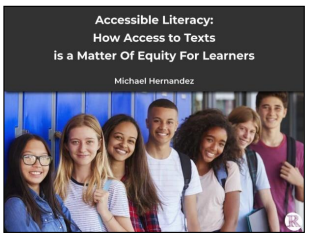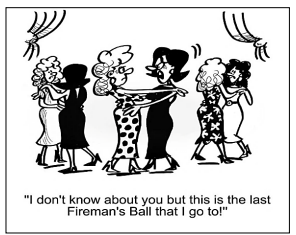Questões Militares de Inglês - Interpretação de texto | Reading comprehension
Foram encontradas 2.202 questões
The relationship of fire with the evolutionary history of vegetation in Brazil
Brazil's biomes and ecosystems differ in their response and vulnerability to fire. Ecosystems characterized by the dominance of grasses – grasslands and savannas – coevolved with fire, and their plants and animals show several adaptations and synergies with fire; therefore, they are considered as fire-dependent from an ecological perspective. The opposite is true for the country's tropical forests that are not fire-adapted and do not easily burn, unless when suffering extreme drought or degradation that can make them more vulnerable to fire. When these forests do burn, fire can cause severe negative effects on their biodiversity, and thus they are considered as fire-sensitive. Natural fire regimes have been modified by human activities – usually related to land use practices or due to climate extremes linked to global warming and to climate change – and often towards higher frequency and extent, as well as altered seasons. Such altered fire regimes usually bring negative effects, not only on biodiversity but also on ecosystem processes and services for human populations. However, in the case of most protected areas, fire has been banished even though the ecosystem is firedependent, what will also lead to important ecological changes and often to a rather rapid loss of their natural characteristics. The trade-offs among the distinct effects of fire on the environment, from biodiversity to ecosystem services, must be considered in all discussions about the fire issue.
Since colonial times a “Zero Fire” policy prevailed in Brazil, even in fire-dependent ecosystems. Only from the 1970's on, other perspectives on fire have slowly developed, as fire became a subject of scientific studies. By then, negative effects of fire exclusion in fire-dependent ecosystems, such as loss of biodiversity and fuel buildup that would lead to catastrophic fires, have been documented. From 2008 on, an Integrated Fire Management Strategy (IFM) was developed and has been increasingly applied in federal protected areas. Besides controlling fuel and decreasing the risk of wildfire, this strategy allows for the integration of traditional fire management practices of local people or at least sets a framework to find joint solutions in the case of conflicts. Despite successes, IFM is yet not widely implemented across the country, and remains restricted to a relatively small number of protected areas, mainly in the firedependent Cerrado. For private land, no general fire management strategy exists. Fires are used for different purposes: in the context of land clearing for future agricultural use (deforestation fires), to manage agricultural or grazing systems, or as part of slash-and-burn systems (swidden cultivation) often practiced by subsistence farmers. While fire may be legally used for agricultural purposes (requiring authorization), a great part of the current fires is illegal, especially when associated with deforestation and suppression of native vegetation. In some cases, policy has been able to reduce the use of fire when alternatives exist, e.g., in sugarcane plantations in the southeastern region. In other types of land management, however, fire remains a cheap and, at the moment, often the only feasible alternative for smallholders exist, but support is needed for their implementation and to allow market access to local producers who change their land management. A clear general strategy to deal with fire on private land – allowing its controlled use when it is overall beneficial, and avoiding it where negative effects overwhelm – still needs to be developed.
(Available: https://www.sciencedirect.com. Perspectives in Ecology and Conservation Volume 19, Issue 3, July–September 2021, Pages 233-255. Adapted.)
Choose the sequence matching text and assertions’ analysis. ( ) A long rain lack might be able to prompt the susceptibility to fire in rain forests. ( ) Fire’s negative effects overwhelm in smallholders’ lands due to livelihood tilling. ( ) A “Zero Fire” police had been in action since colonial times, but it changed round about the 1970’s. ( ) The fire-dependent Cerrado remains the focus of Integrated Fire Management Strategy (IFM) on private and protected areas alike. ( ) It is clear that a general strategy to deal with fire on private and public lands still needs to be averted, if the aim is to allow fire controlled use.

The pandemic and the remote learning that followed highlighted what educators have known for a long time: that learning is a highly individualized endeavor, and everyone learns in different ways and at different speeds. At a time when many parents and educators are concerned about students falling behind due to covid-related illness or school closures, the stakes for keeping kids on track couldn’t be higher.
Even before the pandemic, schools’ reliance on one-sizefits-all learning activities and assessments had calamitous results for students. Students who are continuously behind their peers in reading level become defeated and lose interest in learning – a pattern that continues into their adult life. With 85% of all curriculum based on text(books, handouts, assessments), providing students with an equitable education also means providing an equitable experience with literacy and reading comprehension. The good news is that there is a solution: personalized digital text. This can make a huge difference for students who are struggling readers, both in terms of academic achievement and with the confidence gained by becoming a successful reader. And it turns out that these features benefit all students, not just struggling readers. Even students who are already successful can become more efficient and literate readers.
Tech companies like Adobe are already developing solutions to literacy inequities. Apps like Acrobat Reader have integrated “Liquid Mode”, where users can customize the size, character and line spacing of digital texts in PDF documents. The ability of textbook companies, websites and digital book publishers to adopt similar features and standards provides opportunities for learners of all levels to reach their true potential. The problem with literacy may not be the reader, but the reading material.
(Available: https://readabilitymatters.org/articles/accessible-literacy. Adapted.)
I. Technology is enabling the reading of texts which display lexicon issues. II. Evaluation is mostly grounded in texts, and thus depends on literacy command.
Point out the correct item
Read the text to answer.
Effect of Protective Clothing and Fatigue on Firefighters’ Functional Balance
Every year, more than 38,000 firefighters are injured on the fireground. Among causes of moderate or severe injuries of firefighters, slips, trips, and falls are the most significant cause (28%) of firefighting injuries, followed by overexertion (23%), struck by objects (17%), exposure to detrimental environment (15%), and others (17%). Firefighters regularly work in hot, smoky, and slippery fireground conditions with many obstacles and to provide protection under these circumstances, they wear fully encapsulating “bunker gear style” personal protective equipment (PPE), which includes bunker coat, bunker pants, boots, helmet, face mask, gloves, and self-contained breathing apparatus (SCBA). The primary design requirements for firefighting PPE are to provide protection from the by-products of combustion, but current designs and typical materials have significant negative impacts on balance, mobility, thermoregulation etc. Furthermore, during emergency operations, firefighters may become fatigued by the strenuous firefighting activity and heat stress, which can further impair balance control.
In spite of the obvious benefits of PPE in protecting firefighters from heat, smoke and fire, the use of PPE may negatively affect firefighters’ functional balance. Functional balance is defined as the ability to prevent a loss of balance and maintain body posture while performing functional tasks. Wearing PPE may impair the functional balance of firefighters due to its heavy weight, bulkiness of the material, and a SCBA face mask, which limits vision. Wearing PPE also changes the firefighter’s center of gravity, increases fatigue, and imposes physiological burdens, e.g., increased oxygen consumption and heart rate. The heavy, insulative aspect of PPE also contributes to increased metabolic work done by the firefighter, resulting in increased heat stress that might negatively impact functional balance. During firefighting activity, heat stress and the resulting elevation in body temperature hastens muscular fatigue, promotes dehydration, increases cardiovascular strain, and interferes with cognitive function. While relatively few studies have investigated the effects of firefighting PPE on functional balance, no studies have been found related to the effects of fatigue due to firefighting activity on the functional balance of firefighters.
(P. Hur, KS Rosengren, GP Horn, DL Smith. ideals.illinois.edu – 2013. Adapted.)
Analyse the image to answer 47.

Available: https://www.cartoonstock.com.)
Leia o texto abaixo e marque a opção que melhor descreve o assunto abordado.
Physical training (PT) is an important part of military life and Company Commander or Platoon Commander organizes PT activities every day. Soldiers run every morning. They go to the gym twice a week or three times a week and do weight lifting, sit-ups and push-ups. They usually go to the swimming pool once a week. Soldiers take a physical test every year. A lot of soldiers usually do more sports in their own time. Many soldiers play football every weekend. Some soldiers play tennis, or do karate or boxing.
Read the cartoon and mark the best option that interprets its message.

Mark the only correct option according to the text below.
Cash Flow Problem
“Honey, you have to tell me how we are spending our money”, said the wife to her husband. “I should know about these things.”
“Fine”, said the husband. “we are spending 25 percent on rent, 20 percent on the kids, 30 percent on food, 15 percent on clothes, and 40 percent on the cars.”
“But honey, that’s 130 percent.”
“I know. That’s the problem”
Basic Combat Training (BCT) in the US Army
Soldiers in the United States (US) Army are volunteers. The Army trains recruits at basic training units. The main basic training unit is Fort Jackson in South Carolina.
Basic training is nine weeks. The instructors are non-commissioned officers (NCOs). They teach basic military skills, including drill and weapon training.
Recruits in basic training live and sleep in barracks.
They wear a military uniform. They don’t go home during basic training and they don’t see their family before graduation.
(Source: MELLOR-CLARK, S. ALTAMIRANO, Y. B. Campaign: English for the military. Student’s book 1. p. 14.)
According to the text above, we can infer that:
- I got married, separated, and we have already shared the assets. - What about the children? - The judge decided that they would stay with the one who received the most assets. - So they stayed with their mother? - No, they stayed with our lawyer.
The excerpt that reveals humor is:
1. Type O blood people must eat a lot of meat and avoid milk, yogurt and cheese, for example. 2. Type O blood appeared before the other blood types. 3. Type B diet, which is rich in yogurt, milk, cheese and meat, can cause diabetes. 4. People who want to slow the ageing process or fight cancer and diabetes should follow the blood type diet. 5. Type A blood people should eat many vegetables because this blood type is related to agriculture.
Which of the statements above are TRUE, according to Peter D’Adamo’s ideas?